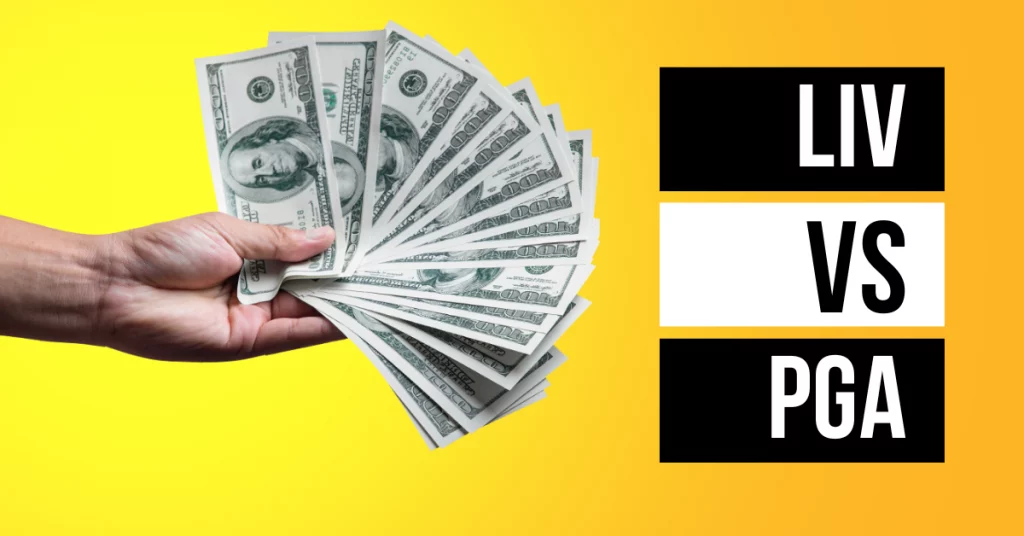There’s a war going on between two competing golf tours, and the lessons for strategists are particularly instructive. Here’s what’s going on:
The PGA Tour Has Had No Direct Competitors — Until Now
The professional golfers association, or PGA Tour is the organizer of the main professional golf tours played by men in the United States and North America. Membership in the PGA has historically been the one and only option for professional golfers who want to compete at the top levels – and for millions of prize money – in the U.S.
As such, the tour has been able to dictate certain terms to its playing members, who nonetheless are independent contractors. For example, players pay their own expenses, they only get paid prize money if they play better than half the field, and players can choose which tournaments they play in – though the tour does dictate that they play in a minimum of 15 events.
The tour also requires the players to get a waiver if they wish to play in non-PGA events, some put on by the European, or Asian professional tours, for example. Until recently, this waiver was a somewhat minor annoyance to golfers. But now, a new league called the LIV (commonly pronounced “live” as in “live and let live”) tour is trying to woo the world’s greatest professional golfing talent, and the PGA Tour is requiring players to choose one or the other. The conflict is producing valuable marketing lessons for businesses in any industry.
A New Challenger With Very Deep Pockets – the LIV Tour
The LIV tour is backed by the very deep pockets of Saudi Arabian government: its CEO is former world #1 golfer and highly successful businessman, Greg Norman. Unlike the PGA, the LIV tour does not require an exclusive commitment; it also offers guaranteed prize money, sign-on bonuses and in-some cases, money for just showing up to the tournament.
From a strategist’s standpoint, there are lessons to be learned here — especially if you, like the PGA Tour, have a product that has been #1 in your market but is facing new challengers.
Lesson #1: You are eventually going to have to decide if you want to be part of a closed ecosystem or an open one.
Here’s what I mean: The LIV tour has not limited players from also playing on the PGA tour. Conversely, the PGA tour has suspended players who have signed on with the LIV tour.
What used to be the only game in town, the PGA tour, is now being painted as a closed ecosystem if you will, by the LIV tour, which offers more freedom of choice. The lesson: by placing any restrictions on your customers or users, in the times we live in, will likely give rise to a competitor with a more flexible stance towards its product or intellectual capital. So, you have to be ready to respond, and you have to respond thoughtfully!
It’s not that being a closed ecosystem is always a bad choice. A company named Apple has made this work well! It’s just that businesses have to be very thoughtful about what it will and won’t allow its stakeholder and customers to do.
For example, if you sell equipment and have your own servicing capabilities, will you let other companies service your stuff if that’s what customers want? You can’t just have a visceral protective reaction. You have to play out how your high potential prospects and customers feel about it, how they view their options, how those customer sentiments and options might change over the next few years, etc.
Lesson #2: You Have Must Have a Defendable Positioning Strategy, or competitors will paint you any way they want!
The LIV tour’s tagline is “Golf but Louder.” This seems directed at golf’s next generation of talent and fan, many who want to see changes to golf’s overall reputation as a quiet, gentlemanly pursuit. LIV’s tagline actually passes the test of effective positioning in that it is unique, important and believable.
But part of executing on positioning is living it in the day-to-day operations of an organization. This requires knowing ahead of time how competitors will try to attack you — and having well-thought through responses and counterpoints.
Many defenders of the PGA Tour – possibly coached by the PGA? — have painted the LIV tour deal for players as “dirty money.” This is because of the fact that it is backed financially by the Saudi government, with its reputation as the rumored killers of Jamal Khashoggi; and based on other reported human rights abuses in the Kingdom, as well as alleged sponsorship of terrorism.
This reputational attack shouldn’t surprise Norman, the LIV CEO and one of the chief sellers of the new brand. But it seems like it did! When asked about the rumored Khashoggi killing, Norman didn’t re-direct with a well thought out countering message. His response? A tone-deaf, colossal rationalization that included the words “we all make mistakes.”
That doesn’t sound like a organization that has anticipated what seems like a fairly obvious challenge to its approach. But all businesspeople have to ask themselves these 3 questions: “Does our company formally anticipate such challenges in our marketplace. Do we have a consistent, powerful response? Or do we just assume our customer-facing personnel will get it right?”
Lesson #3: You Must Plan to Make Your Third Move First.
You see, both of the previous lessons can be anticipated and overcome prior to them being played out clumsily in the marketplace by adding a simple but seldom-used tool to a company’s strategic planning: competitive war-gaming. War-gaming goes beyond simple strategic discussions — it actively puts teams into the shoes of competitors to think like them, act out scenarios that are likely to happen in the market, and model the optimal responses that serve the goals of your organization.
When we facilitate war games, we are always astounded at the changes in the original strategy — and the success of the execution of the new strategy— that come from teams being willing to spend even a couple of days on the activity. Both of these golfing organizations, if they embraced the war gaming discipline, would make different strategic moves than they are right now.
Clear #1 Market Leaders Need War-Gaming More Than Anyone Else
It will be interesting to see how this plays out, but the incumbent PGA Tour has many advantages going for it. They will have to make a lot of mistakes to lose here, but that’s the point; by war-gaming, they can avoid these missteps.
And if you are a clear #1 in your field, or trying to challenge one, use competitive war-gaming to filter through what’s likely to happen. Instead of stumbling, make your third move first.

 Tom Spitale
Tom Spitale